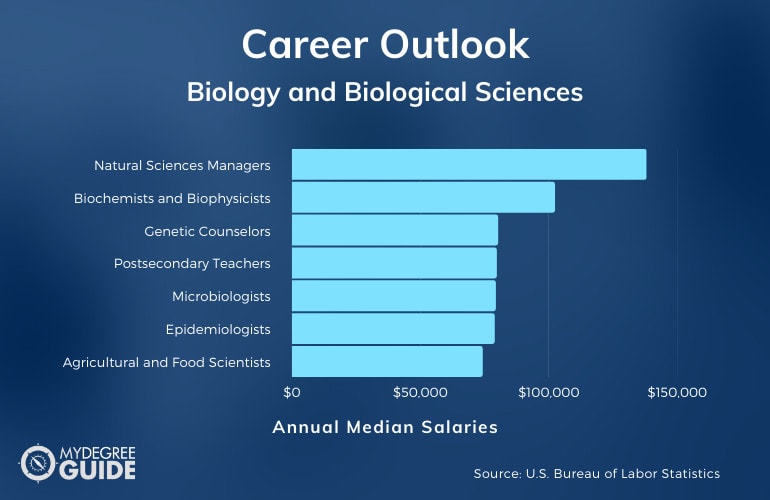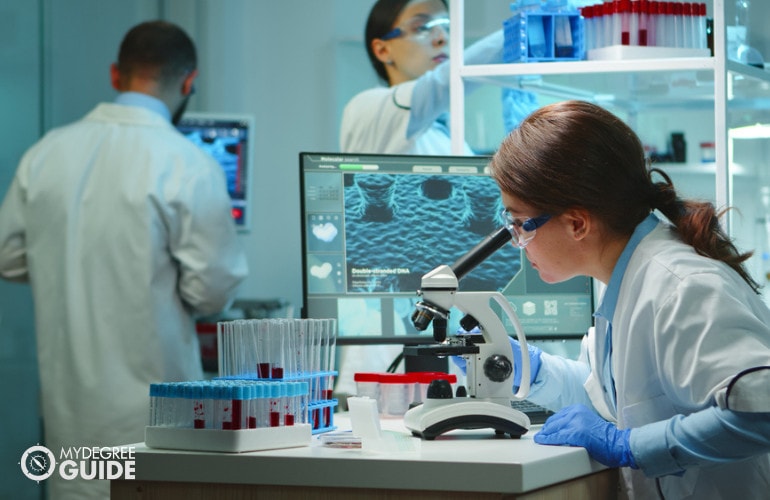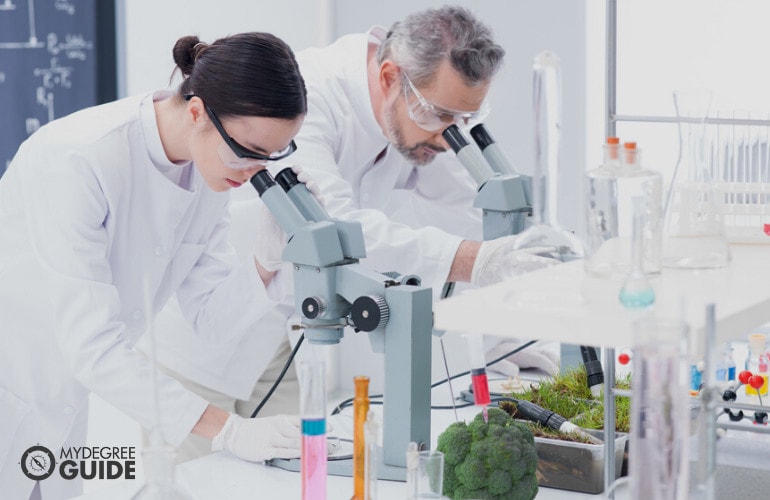A masters degree in biology might appeal to you if you have an interest in living organisms and a knack for identifying and addressing problems.

In a graduate degree program, you have the opportunity to build your analytical and research skills under the direction of a team of experienced faculty.
Editorial Listing ShortCode:
Many biology graduates go on to contribute important scientific discoveries in healthcare, medicine, and zoology, impacting the lives of individuals and communities alike.
Universities Offering Online Masters in Biology Degree Programs
Methodology: The following school list is in alphabetical order. To be included, a college or university must be regionally accredited and offer degree programs online or in a hybrid format.
Alcorn State University
Alcorn State University offers a Master of Science in Biology. The program requires 33 credits of coursework and has both thesis and non-thesis options. Coursework includes Advanced Cellular and Molecular Biology, Advanced Biostatistics, Molecular Genetics, Advanced Anatomy and Physiology, and more. Students in the program also have a wide range of elective options.
Alcorn State University is accredited by the Southern Association of Colleges and Schools Commission on Colleges.
Bemidji State University
Bemidji State University offers two options for pursuing an MS in Biology: a fully online, non-thesis option and a residential hybrid program that includes a thesis requirement. The online option requires 36 credits of coursework, and the residential option requires 30. Applications for the online option are accepted on a rolling basis.
Bemidji State University is accredited by the Higher Learning Commission.
Clemson University
Clemson University offers an MS in Biological Sciences. The program provides a high level of flexibility in choosing coursework geared toward personal interests. To graduate, students must complete 30 credit hours, including a 6 credit thesis. Clemson’s Department of Biological Sciences has state-of-the-art labs and research facilities.
Clemson University is accredited by the Southern Association of Colleges and Schools Commission on Colleges.
Eastern Illinois University
Eastern Illinois University offers a Master of Science in Biological Sciences. The program has both thesis and non-thesis options on campus, as well as a non-thesis online option. The curriculum is flexible, and students have opportunities to conduct research and participate in field experiences.
Eastern Illinois University is accredited by the Higher Learning Commission of the North Central Association of College and Schools.
Grand Canyon University
Grand Canyon University offers a Master of Science in Biology with an emphasis in Education. The program is available online and consists of 34 credits’ worth of 8 week courses. These include A Comprehensive Overview of Phylogenetics and Ecology, Curricular and Instructional Methods in Higher Education, Concepts of Biochemistry, and more.
Grand Canyon University is accredited by the Higher Learning Commission.
Indiana State University
Indiana State University offers a non-thesis, online program for an MS in Biology. The program requires the completion of 32 credits and can typically be finished in 3 to 5 years of part-time study. Students can potentially finish in 2 years of full-time study if they are able to come to campus for some courses. The curriculum includes numerous elective options.
Indiana State University is accredited by the Higher Learning Commission.
Indiana University
Indiana University offers a Master of Arts for Teachers in Biology. The curriculum includes 30 credit hours of coursework. Classes include Evolution, Immunology, Instruction in the Context of Curriculum, Bioinformatics: Theory and Application, Critical Analysis of Scientific Literature, and more. All courses are fully online.
Indiana University is accredited by the Higher Learning Commission.
Lehigh University
Lehigh University offers an online, part-time program for a Master’s in Molecular Biology. The program requires 30 credits of coursework, including eight required courses, such as Organic Chemistry, Genetics, and Intro to Cell and Molecular Biology. Students may also choose electives to suit their goals and interests.
Lehigh University is accredited by the Middle States Commission on Higher Education.
Liberty University
Liberty University’s MS in Human Biology program is 100% online. Students are required to complete 34 credit hours’ worth of 8 week courses, such as Principles of Physiology I and Foundations of Medical Anatomy I. Students also have the option to come to campus for intensives that provide hands-on experience. The degree usually takes a 1.5 years to complete.
Liberty University is accredited by the Southern Association of Colleges and Schools Commission on Colleges.
Mississippi State University
Mississippi State University offers an online program for a Master of Science in General Biology. This is a Teachers in Biology program intended for secondary school teachers. Students are required to complete 33 semester hours of coursework and can typically graduate in 2 years. The program does include a capstone experience on campus.
Mississippi State University is accredited by the Southern Association of Colleges and Schools Commission on Colleges.
Texas A&M University – Commerce
Texas A&M University—Commerce offers a Master of Science in Biological Sciences. The program is available both on campus and online. The thesis option requires 30 credit hours of coursework, and the non-thesis option requires 36. Most students can finish in 2 to 3 years.
Texas A&M University-Commerce is accredited by the Southern Association of Colleges and Schools Commission on Colleges.
University of Florida
The University of Florida offers an online program for an MS in Microbiology and Cell Science. Applicants can apply without GRE scores, and accepted students can start in the spring, summer, or fall. Courses include asynchronous elements and allow students to complete them at their own pace. The program can potentially be finished within 1 year.
The University of Florida is accredited by the Southern Association of Colleges and Schools Commission on Colleges.
University of Illinois – Urbana Champaign
The University of Illinois—Urbana Champaign offers an online program for a Master of Science in Teaching Biology intended for working teachers. The program consists of 8 week courses that can be completed fully online. Courses include Emerging Infectious Diseases, Education Reforms and Inquiry, Human Genome and Bioinformatics, and more. Virtual meetings occur once a week in the evenings.
The University of Illinois – Urbana Champaign is accredited by the Higher Learning Commission.
University of Nebraska – Kearney
The University of Nebraska—Kearney offers a Master of Science in Biology that can be completed online or on campus. The program is intended for secondary school teachers. Students must complete 36 credit hours of courses. Course options include Principles of Immunology, Organic Evolution, Plant Physiology, Evolution of Epidemics, and more.
UNK is accredited by the Higher Learning Commission.
University of Northern Colorado
The University of Northern Colorado offers an online, non-thesis program for a Master of Science in Biological Science. Accepted students may start in fall or spring semesters. Most students take five to eight credit hours per semester and finish in 2 or 3 years. Course options include Biomedicine and Careers, Foundations of Clinical Research, Virology, and more.
The University of Northern Colorado is accredited by the Higher Learning Commission.
University of Saint Joseph
The University of Saint Joseph offers an online program for a Master of Science in Biology. The program provides a comprehensive curriculum to prepare students for a wide variety of careers. The courses are designed to allow students to study at their own pace. Online students still get to interact with classmates through threaded discussions.
The University of Saint Joseph is accredited by the New England Commission of Higher Education.
University of West Alabama
The University of West Alabama offers an online program for an MS in Conservation Biology. Students are required to complete 36 credit hours’ worth of 8 week courses and can usually finish in 1 to 2 years. Thesis and non-thesis options are available. The curriculum is designed to develop students’ research skills and knowledge of ecosystems and biodiversity.
The University of West Alabama is accredited by the Southern Association of Colleges and Schools Commission on Colleges.
Western Governors University
Western Governors University offers a Master of Arts in Science Education. The program is intended for those already licensed as teachers. Most students can finish in 2 years. Coursework includes Heredity and Genetics, Molecular and Cellular Biology, Concepts in Science, Ecology and Environmental Science, and more.
Western Governors University is accredited by the Northwest Commission on Colleges and Universities.
Western Kentucky University
Western Kentucky University’s Master of Science in Biology program is available 100% online and does not require a thesis. Courses are available year-round. Students are required to complete 30 credit hours of electives and can customize their curriculum through a wide range elective options. Students may also earn the degree in a traditional format with a thesis.
Western Kentucky University is accredited by the Southern Association of Colleges and Schools Commission on Colleges.
Worcester Polytechnic Institute
Worcester Polytechnic Institute offers a Master of Science in Biotechnology that can be earned fully on campus or in a blended format that features online coursework and on-site lab sessions. The blended option does not include a thesis. Most of WPI’s online courses are asynchronous. Courses include Bioinformatics, Drug Regulations, Medicinal Chemistry, and more.
WPI is accredited by the New England Commission of Higher Education.
Online Masters Degree in Biology Programs

In broad terms, biology is the study of life. The field of biology encompasses many diverse areas, such as ecology, genetics, physiology, and medicine.
Typically, graduate-level biology programs are open to students with an undergraduate degree in biology. Admissions requirements can vary between schools, though, so it’s always helpful to check the specific guidelines for prospective colleges or universities.
A graduate degree biology program often emphasizes research as part of its curriculum. There are many biological research specialties to choose from, including:
- Wildlife biology
- Mycology
- Embryology
- Immunology
- Physiology
In addition to classes specific to your selected concentration or research specialty, you’ll also be required to complete core coursework.
Every graduate degree program has its unique curriculum, but you may study topics similar to those listed below:
- Biological research methods
- Ecology and evolution
- Cell and molecular biology
- Biostatistical analysis
- Immunology
Many biology masters degrees also include a thesis requirement. In addition to completing a thesis, you may be expected to complete a certain amount of laboratory or field research under the supervision of an experienced faculty mentor.
After graduation, some students choose to continue their education, enrolling in doctorate degree programs or medical or dental school. Others decide to enter into the workforce, pursuing a wide variety of professional positions related to their research specialty or concentration.
Potential career paths for professionals with a master degree in biology include:
- Postsecondary teacher
- Microbiologist
- Forensic scientist
- Zoologist
- Biochemist
- Geneticist
Many graduates also continue to conduct original research and contribute to scientific studies and findings in their field.
Biology and Biological Sciences Careers & Salaries

Biology master’s programs can lead to employment opportunities in a number of industries, including scientific research and development, local government, and education.
Some positions may require you to specialize in a specific area of research in order to be qualified. Employers are often looking for candidates who have hands-on experience in their field as well as the appropriate knowledge and tools to be successful in a professional role.
According to the Bureau of Labor Statistics, these are some of the common career paths that biology graduates pursue.
| Careers | Annual Median Salaries |
| Natural Sciences Managers | $137,900 |
| Biochemists and Biophysicists | $102,270 |
| Genetic Counselors | $80,150 |
| Postsecondary Teachers | $79,640 |
| Microbiologists | $79,260 |
| Epidemiologists | $78,830 |
| Agricultural and Food Scientists | $74,160 |
| Zoologists and Wildlife Biologists | $64,650 |
| Forensic Science Technicians | $61,930 |
| Clinical Laboratory Technologists and Technicians | $57,800 |
A master’s degree in biology can be a useful step in the journey toward medical school or dental school. Earning a master’s degree in biology can help prepare you for professional positions after graduation, but it does not guarantee you a certain role or salary.
The hiring process varies by company and organization and can be influenced by a variety of factors, including previous experience, geographic location, and degree specialization.
MS in Biology Curriculum & Courses

Coursework for biology graduate schools will vary depending on your research area and program. Here are some examples of courses you may come across:
- Biological Research Methods: In this course, you’ll explore different methods of biological research, including experimental design, scientific writing, and scientific literature.
- Ecology and Evolution: Covering areas such as aquatic ecology, mating systems, population dynamics, and community ecology, this course provides an in-depth look at modern research in ecology and evolution.
- Cell and Molecular Biology: You’ll explore the current research in the discipline of cell and molecular biology, covering topics like recombinant DNA and embryo physiology.
- Biostatistical Analysis: In this course, you’ll learn common statistical tests and data analysis used in the field of biology, including topics such as distributions estimation, variances, and regression and correlation.
- Immunology: This course is an overall examination of the immune system, and you may study topics like immunodeficiency, autoimmunity, and development of the immune system.
- Physiology: This course may focus on a specific area of physiology, such as the functional characteristics of plants or animals.
- Bioinformatics: In this course, you’ll learn to understand biological data using specific software and technological tools.
- Advanced Cell Biology: You’ll learn advanced cell biology concepts, including DNA replication and repair, protein structure and function, and epigenetics.
- Research Rotation: This course is often offered as a way to try different research areas before selecting the one you would like to focus on, offering rotations between labs and introducing you to several potential advisors.
- Thesis Research: This class is an opportunity to create a thesis and work with the thesis committee to make changes and complete a first draft.
Some programs also require you to complete additional hands-on experiences, such as internships.
Master of Arts in Biology Admissions Requirements

Admissions requirements differ from program to program, although most schools require similar items in their applications.
Typical masters-level applications include some, or all, of the following:
- GRE or GMAT scores (only when required)
- Letters of recommendation
- Official college transcripts
- Statement of purpose
- Resume or CV
Many schools require your undergraduate degree to have been earned from an accredited college or university. Additionally, some schools will ask that you meet with an advisor to ensure that the program can meet your expectations and help you advance in your career goals.
Masters in Biology Programs Accreditation

A school can choose to participate in a review process called accreditation. Regional accreditation ensures that a college or university is offering educational programs and facilities of high quality.
Being an accredited institution can help schools appeal to applicants and attract qualified teaching staff. You can be confident that the curriculum, instructors, and facilities at a regionally accredited school are equipped to teach you the information you need to be an expert in your field of study.
Additionally, as you look for a job after graduation, employers will likely check the credibility of your degree by making sure it has been awarded by an accredited school.
Financial Aid and Scholarships

Financial aid and scholarship opportunities provide a way for individuals from a diverse range of backgrounds to attend college. You can start the financial aid process by filling out the Free Application for Federal Student Aid, or FAFSA. Using the personal information you provide, this form calculates the amount of government aid you are eligible to receive.
Federal financial aid can be awarded in many different forms, the most common of which is student loans. You may also explore federal work-study opportunities, in which you hold a job on campus in exchange for financial support in covering tuition or academic materials. Your university may have scholarship opportunities and work-study programs as well.
Is Biology a Good Career Choice?
Yes, biology is a good career choice for many professionals. Many graduates go on to work in high-earning professional roles in a variety of industries.
Biochemists and biophysicists, for example, have a median annual salary of $102,270 (Bureau of Labor Statistics). Meanwhile, microbiologists and zoologists have median annual salaries of $79,260 and $64,650, respectively. In addition to the high earning potential, many careers in biology offer considerable benefits and stable work environments.
What Masters Degree Can I Get with a Bachelors in Biology?
There are many available graduate programs for biology majors. Possible masters degree programs for those with a bachelors in biology include:
- Medical Degree
- Master of Science in Biology
- Master of Education
- Master of Science in Computational Biology
There are many biology subfields and specializations to be studied as well. You can select the masters program that aligns best with your personal interests and career goals. It is beneficial to check the admissions requirements for prospective schools, as each can have a unique set of guidelines.
What Can I Do with a Masters in Biology?

Biology masters programs can help you begin a career in various industries, such as scientific research, education, and healthcare.
Many biology graduates pursue a career as a zoologist or wildlife biologist. Others choose to become microbiologists or conservation scientists. Instead of pursuing a career directly after graduation, many students choose to earn a doctorate degree and enter into academia or research. Still others decide to go on to medical or dental school, working toward a career as a doctor or dentist.
Is Biology Hard?
Whether or not biology is perceived as a difficult subject depends on the individual. A biology graduate curriculum will differ depending on your area of concentration, but common course topics include immunology, advanced cell biology, and biological research methods.
Because it’s the study of living organisms, the field of biology does require the ability to navigate extensive subject-specific vocabulary. It also requires a lot of lab work and research. Many people who pursue a degree in biology are also comfortable with mathematical thinking as well as writing.
How Long Does It Take to Get an Online Biology Master’s Degree?

It typically takes 1 to 2 years to finish a masters degree program. A 36 credit hour master’s program with no thesis requirement can generally be completed in 1 year with full-time enrollment, including during the summer.
Many graduate programs do require you to complete a thesis, though, as the final piece of your studies, and this includes biology degree online graduate programs. A thesis will often add some additional time to your completion date. If you choose to enroll in school part-time, that can also extend the time it takes you to graduate.
A growing number of universities offer an accelerated biology degree online, which may allow you to earn your bachelors, masters, or even a PhD in biology online degree in less time.
What’s the Difference Between an Online Masters in Biology vs. Biological Sciences?
While the terms “biology” and “biological sciences” are sometimes used interchangeably, they can also refer to a difference in content.
| Masters in Biology | Masters in Biological Sciences |
|
|
If you are more interested in the natural world and the study of plants and animals, pursuing a master’s degree in biology may be a fitting path for you.
Is a Masters Degree in Biology Worth It?

Yes, a masters degree in biology is worth it for many professionals. You can often tailor a graduate degree in biology to fit your career aspirations and personal passions. Choosing a concentration enables you to advance your expertise and qualifications in a specialized area of study.
Many careers in the field of biology are also experiencing employment growth rates as fast as the national average for all other occupations. According to the Bureau of Labor Statistics, life, physical, and social science occupations overall are expected to grow 8% over the next ten years.
Getting Your Masters in Biology Online

If you are interested in the study of life and hold an undergraduate degree in biology or a related science, then earning your online master’s in biology may be the next step for you.
A masters degree in biology can help you expand your knowledge in a specific sub-field. This could also help you work toward a career that aligns with your interests post-graduation. Not only can you learn to analyze data, but you will also have the opportunity to conduct your own research.
You can begin your graduate journey today by exploring accredited colleges and universities that offer master in biology programs. Comparing available program options could help you find the degree track that best fits your goals and aspirations.
